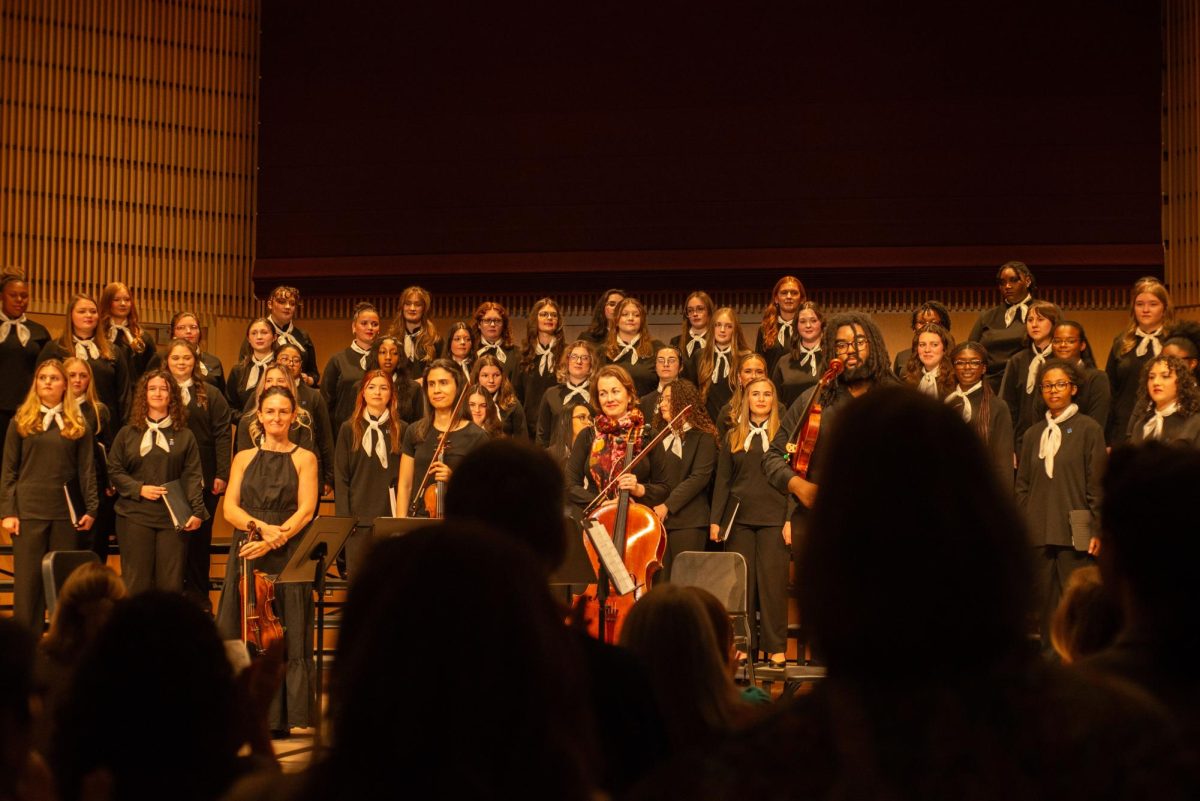
Anne Louise Phillips
On April 3, the lights in Mississippi State University’s Music Building Recital Hall dimmed. Two screens on either side of the room lit up, a slideshow of Holocaust images appearing.
Phillip Stockton, assistant clinical professor of music and associate director of choral studies at Mississippi State, stepped up to the podium to introduce the performance by Schola Cantorum, a treble choral ensemble comprised of MSU students.
“This project started serendipitously,” Stockton said. “I was struggling to find something for Schola Cantorum. I was looking for something special and relevant to today. I came across this work by Linda Tutas Haugen.”
Stockton decided to use Haugen’s composition “Anne Frank: A Living Voice,” which sets excerpts of Anne Frank’s “The Diary of a Young Girl” to music.
Stockton spoke to the audience, admitting that he had been assigned to read Anne Frank’s diary in high school but had chosen to read a summary instead. This admission was met with laughter, which quickly died down as Stockton described a book club he held with the choir. To prepare for the performance, they read the diary together.
The audience was sobered as Stockton discussed this book club and reiterated the hard truth that Anne Frank, a girl of a similar age to the girls they were about to see perform, had gone through psychological horrors they could not comprehend.
Then the performers entered, and the theme from “Schindler’s List” reverberated through the room.
In high, clear voices, the choir recounted Anne Frank’s short life through quotes from her diary. Each piece focused on a different aspect of her life, from the unsettling silence to the small joys of glimpses out the window she experienced while in hiding from the Nazis.
Between songs, the audience clapped hesitatingly with wide eyes, torn between celebrating a beautiful performance but also mourning the horrors of the Holocaust and the death of a young woman.
The final movement of the performance left the audience on a hopeful note despite the tragedy. The choir pulled out candles, viewed as symbols of hope especially in Jewish culture, at the moment they began singing Haugen’s song “Even When He Is Silent,” emphasizing the hope Anne carried in the midst of silence and the hope we can carry today.
Sarah Beth Heard, one of the performers and a junior psychology and voice double major, paused after the performance to reflect.
“Getting to relate to Anne Frank’s feelings and struggles through her diary ensures that people cannot forget the Holocaust,” Heard said.
Pamela Heard, Sarah Beth Heard’s mother, drove four hours to see the performance and said she found it moving.
“This little girl still teaches us so much about faith, love, honor, family and resilience,” Pamela Heard said. “I was brought to tears.”
Gabriella Joy Arbesfield, another performer and a senior voice major, said this performance was especially important to her because of her Jewish heritage and the opportunity to share a story tied to her history.
“This performance is not just a retelling of Anne Frank’s story; it is a call to remember the humanity behind history,” Arbesfield said. “As someone who is Jewish, being a part of this performance has been incredibly meaningful. It is a way of honoring my heritage and the countless lives affected by the Holocaust. It is also an opportunity to share this history with people who may have never encountered its weight before. I feel so grateful to take part in something so powerful, so full of heart.”
Arbesfield’s final observation echoed the last hopeful notes of the performance.
Arbesfield said, “Through storytelling, we are not just remembering—we are educating, we are connecting and we are keeping hope alive.”
